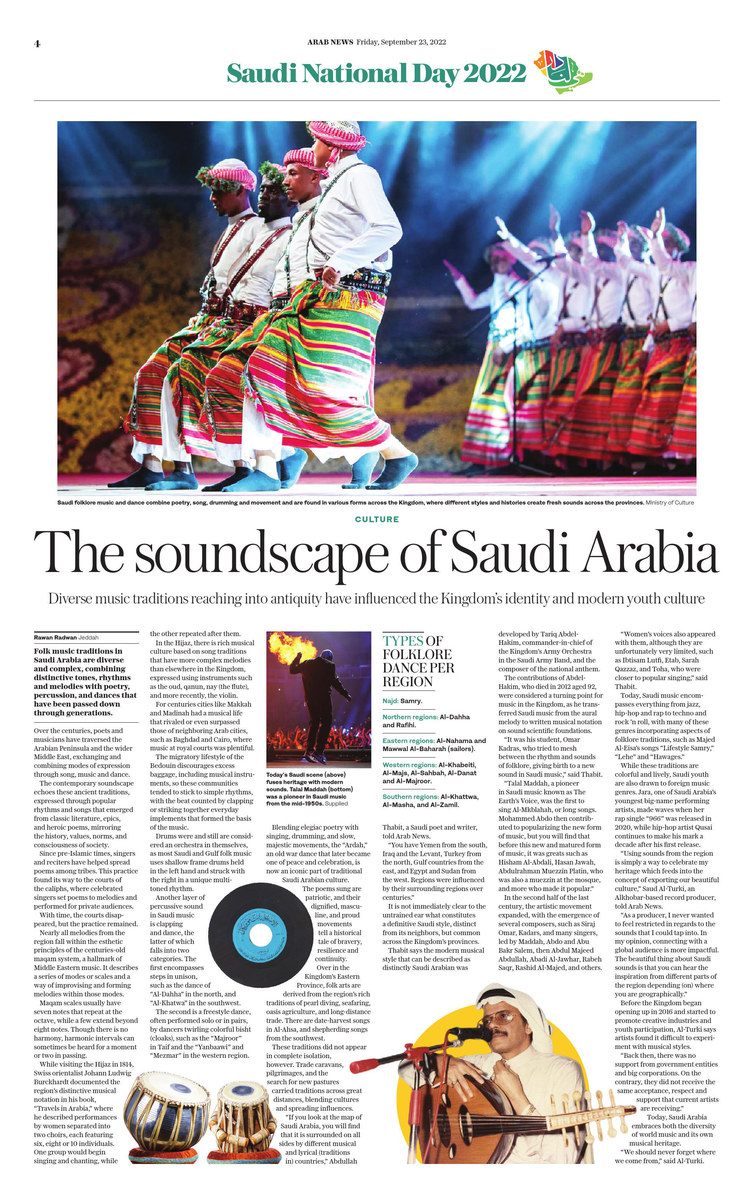JEDDAH: Folk music traditions in Saudi Arabia are diverse and complex, combining distinctive tones, rhythms and melodies with poetry, percussion, and dances that have been passed down through generations.
Over the centuries, poets and musicians have traversed the Arabian Peninsula and the wider Middle East, exchanging and combining modes of expression through song, music and dance.
The contemporary soundscape echoes these ancient traditions, expressed through popular rhythms and songs that emerged from classic literature, epics, and heroic poems, mirroring the history, values, norms, and consciousness of society.
Since pre-Islamic times, singers and reciters have helped spread poems among tribes. This practice found its way to the courts of the caliphs, where celebrated singers set poems to melodies and performed for private audiences.
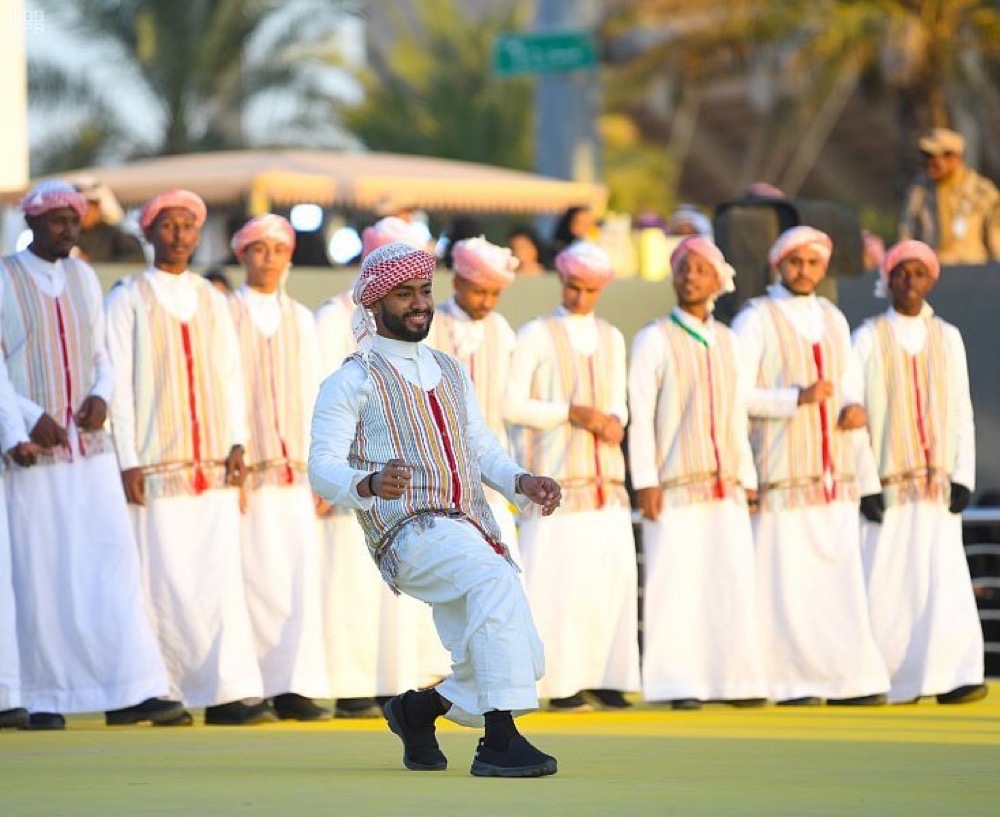
Another layer of percussive sound in Saudi music is clapping and dance, the latter of which falls into two categories. The first encompasses steps in unison, such as the dance of “al-dahha” in the north, and “al-khatwa” in the southwest. (SPA)
With time, the courts disappeared, but the practice remained.
Nearly all melodies from the region fall within the esthetic principles of the centuries-old maqam system, a hallmark of Middle Eastern music. It describes a series of modes or scales and a way of improvising and forming melodies within those modes.
Maqam scales usually have seven notes that repeat at the octave, while a few extend beyond eight notes. Though there is no harmony, harmonic intervals can sometimes be heard for a moment or two in passing.
While visiting the Hijaz in 1814, Swiss orientalist Johann Ludwig Burckhardt documented the region’s distinctive musical notation in his book, “Travels in Arabia,” where he described performances by women separated into two choirs, each featuring six, eight or 10 individuals. One group would begin singing and chanting, while the other repeated after them.
In the Hijaz, there is rich musical culture based on song traditions that have more complex melodies than elsewhere in the Kingdom, expressed using instruments such as the oud, qanun, nay (the flute), and more recently, the violin.
For centuries cities like Makkah and Madinah had a musical life that rivaled or even surpassed those of neighboring Arab cities, such as Baghdad and Cairo, where music at royal courts was plentiful.
The migratory lifestyle of the Bedouin discourages excess baggage, including musical instruments, so these communities tended to stick to simple rhythms, with the beat counted by clapping or striking together everyday implements that formed the basis of the music.
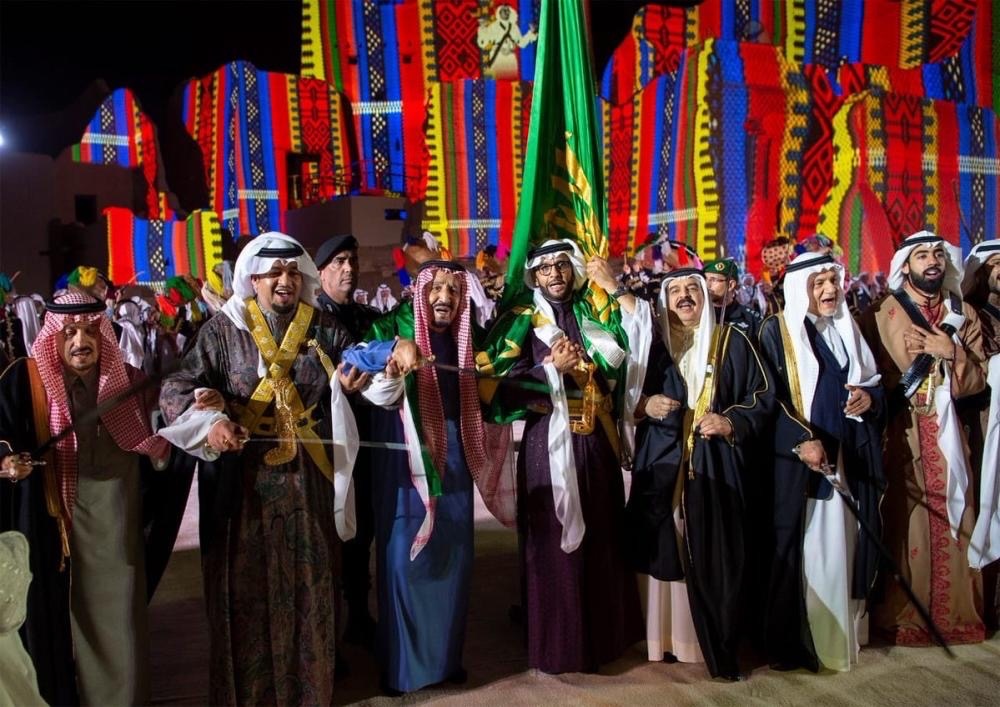
King Salman partaking in the “ardah,” an old war dance. (SPA)
Drums were and still are considered an orchestra in themselves, as most Saudi and Gulf folk music uses shallow frame drums held in the left hand and struck with the right in a unique multi-toned rhythm.
Another layer of percussive sound in Saudi music is clapping and dance, the latter of which falls into two categories. The first encompasses steps in unison, such as the dance of “al-dahha” in the north, and “al-khatwa” in the southwest.
The second is a freestyle dance, often performed solo or in pairs, by dancers twirling colorful bisht (cloaks), such as the “majroor” in Taif and the “yanbaawi” and “mezmar” in the western region.
Blending elegiac poetry with singing, drumming, and slow, majestic movements, the “ardah,” an old war dance that later became one of peace and celebration, is now an iconic part of traditional Saudi Arabian culture.
The poems sung are patriotic, and their dignified, masculine, and proud movements tell a historical tale of bravery, resilience and continuity.
Over in the Kingdom’s Eastern Province, folk arts are derived from the region’s rich traditions of pearl diving, seafaring, oasis agriculture, and long-distance trade. There are date-harvest songs in Al-Ahsa, and shepherding songs from the southwest and other regions.

Tarouf Abdel-Kheir Adam, popularly known as Etab. (Supplied)
These traditions did not appear in complete isolation, however. Trade caravans, pilgrimages, and the search for new pastures carried traditions across great distances, blending cultures and spreading influences.
“If you look at the map of Saudi Arabia, you will find that it is surrounded on all sides by different musical and lyrical (traditions in) countries,” Abdullah Thabit, a Saudi poet and writer, told Arab News.
“You have Yemen from the south, Iraq and the Levant, Turkey from the north, Gulf countries from the east, and Egypt and Sudan from the west. Regions were influenced by their surrounding regions over centuries.”
It is therefore not immediately clear to the untrained ear what constitutes a definitively Saudi Arabian musical style, distinct from its neighbors, but common across the Kingdom’s provincial boundaries.
Thabit says the modern musical style that can be described as distinctly Saudi Arabian was developed by Tariq Abdel-Hakim, commander-in-chief of the Kingdom’s Army Orchestra in the Saudi Army Band, and the maestro who composed the Saudi national anthem.
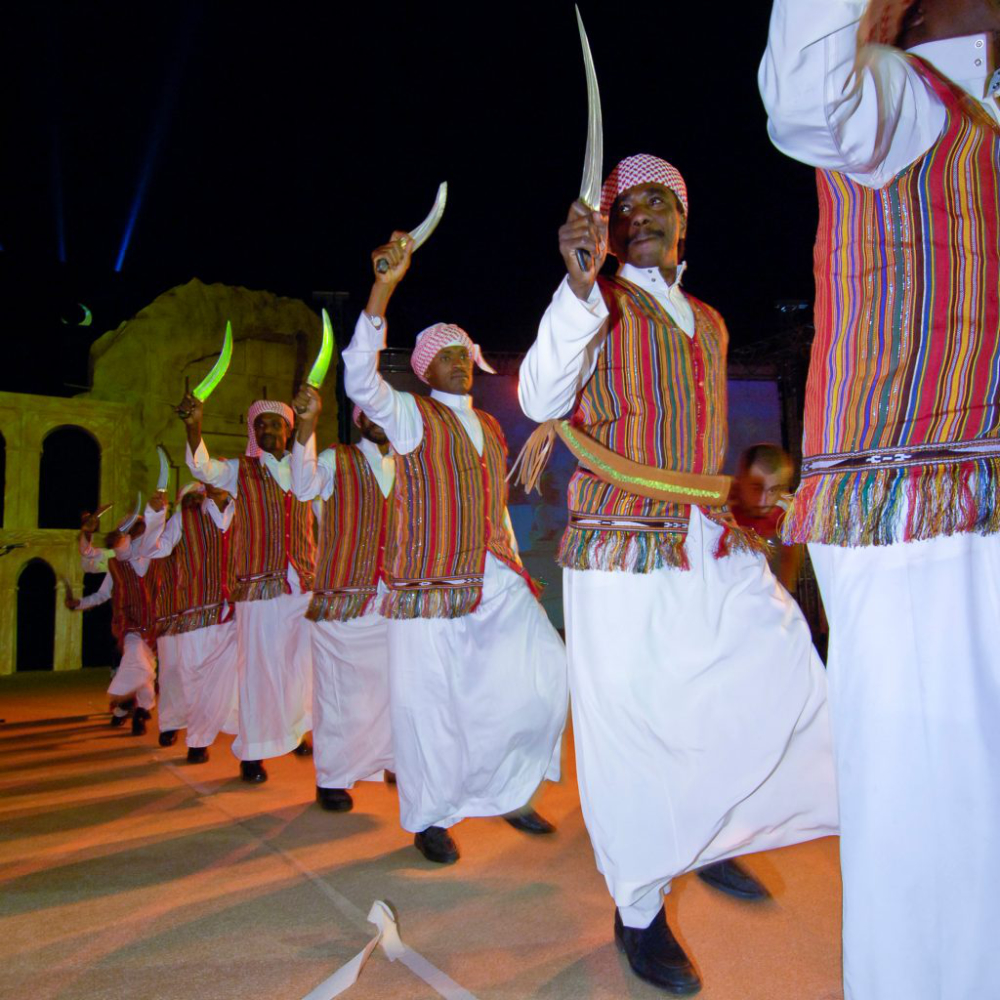
In the Hijaz, there is rich musical culture based on song traditions that have more complex melodies than elsewhere in the Kingdom. (SPA)
The contributions of Abdel-Hakim, who died in 2012 at the age of 92, were considered a turning point for music in the Kingdom, as he transferred Saudi music from the aural melody to written musical notation on sound scientific foundations.
“It was his student, Omar Kadras, who tried to mesh between the rhythm and sounds of folklore, giving birth to a new sound in Saudi music,” said Thabit.
“Talal Maddah, a pioneer in Saudi music known as The Earth’s Voice, was the first to sing Al-Mkblahah, or long songs. Mohammed Abdo then contributed to popularizing the new form of music, but you will find that before this new and matured form of music, it was greats such as Hisham Al-Abdali, Hasan Jawah, Abdulrahman Muezzin Platin, who was also a muezzin at the mosque, and more who made it popular.”
In the second half of the last century, the artistic movement expanded and witnessed the emergence of several composers, such as Siraj Omar, Kadars, and many singers, led by Maddah, Muhammad and Abu Bakr Salem, then Abdul Majeed Abdullah, Abadi Al-Jawhar, Rabeh Saqr, Rashid Al-Majed and others.
“Women’s voices also appeared with them, although they are unfortunately very limited, such as Ibtisam Lutfi, Etab, Sarah Qazzaz, and Toha, who were closer to popular singing,” said Thabit.
Today, Saudi music encompasses everything from jazz, hip-hop and rap to techno and rock ’n roll, with many of these genres incorporating aspects of folklore traditions, such as Majed Al-Eisa’s songs “Lifestyle Samry,” “Lehe” and “Hawages.”
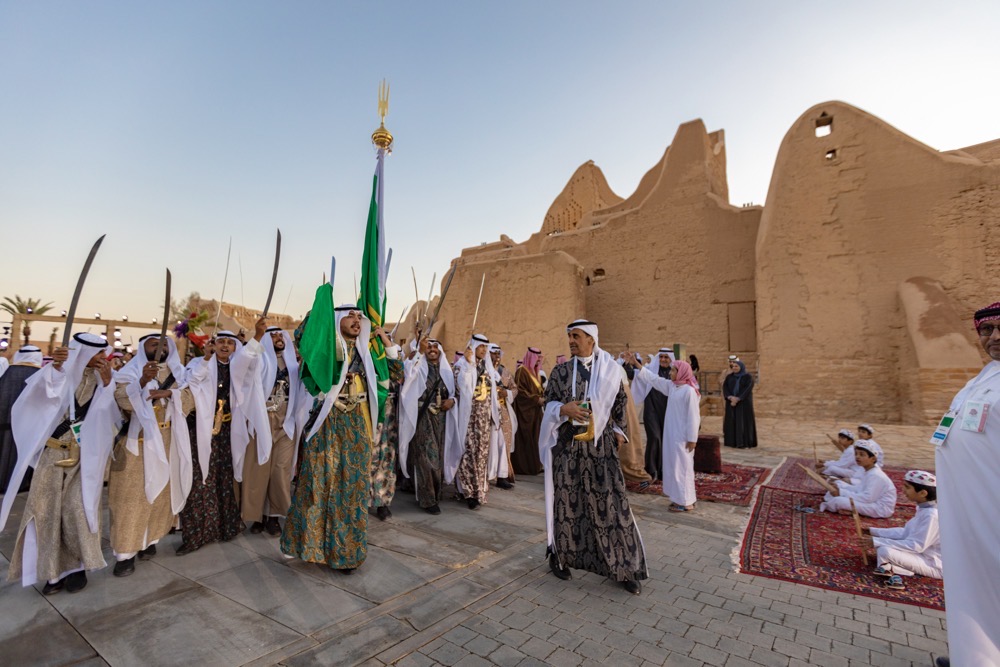
It is not immediately clear to the untrained ear what constitutes a definitively Saudi Arabian musical style, distinct from its neighbors, but common across the Kingdom’s provincial boundaries. (SPA)
While these traditions are colorful and lively, Saudi youth are also drawn to foreign music genres. Jara, one of Saudi Arabia’s youngest big-name performing artists, made waves when her rap single “966” was released in 2020, while hip-hop artist Qusai continues to make his mark a decade after his first release.
“Using sounds from the region is simply a way to celebrate my heritage which feeds into the concept of exporting our beautiful culture,” Saud Al-Turki, a Khobar-based record producer, told Arab News.
“As a producer, I never wanted to feel restricted in regards to the sounds that I could tap into. In my opinion, connecting with a global audience is more impactful. The beautiful thing about Saudi sounds is that you can hear the inspiration from different parts of the region depending (on) where you are geographically.”
Before the Kingdom began opening up in 2016 and started to promote creative industries and youth participation, Al-Turki says experimenting with musical styles was not commonplace.
“Back then, there was no support from government entities and big corporations. On the contrary, they did not receive the same acceptance, respect and support that current artists are receiving,” he said.
Today, Saudi Arabia is embracing the diversity of world music and evolving tastes, while never losing sight of its heritage.
“We should never forget where we come from,” said Al-Turki. “Saudi Arabia is historically diverse and there’s nothing more beautiful than a diverse culture. We have different sounds in every region that deserve to be appreciated and showcased.
“It is our duty to highlight and pay homage.”
